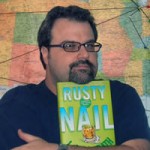
Jane Friedman
Jane Friedman of Writer’s Digest (and former President and CEO of HarperCollins) passed on a somewhat horrifying statistic bandied about at BEA this week:
“7% of books published generate 87% of book sales. And 93% of all published books sell less than 1,000 copies each.”
Now the encouraging part is that those statistics were quoted during a panel discussion on DIY (Do It Yourself) publishing and how it’s changing the publishing world. Here’s the complete article from Publishers Weekly. If you’re

J.A. Konrath
feeling hopeless about ever getting your book published and into the hands of readers, I encourage you to read the whole article. Apparently, there is life after self-publishing. What kind of life is still up for debate. If you’re an established author like J.A. Konrath, it sounds like the life can be pretty good.
Here’s my quandary: I went ahead and self-published my first novel. Many traditionalists in the publishing industry will say I’ve pretty much shot myself in the foot…I’m branded forever. Any agent reading my query letter for my next novel will note my first book, look it up, and see it didn’t sell anywhere near 10,000 copies and pretty much assume that I don’t have what it takes. (Unfair, I know, but all they need is one little excuse to throw my query away.) So…do I try to publish traditionally under a different name (and does that even work?), or do I continue the self-publishing route? After all, if I can gradually build my own audience, who needs the elite publishing houses of NYC?
But then that statistic smacks me in the face again. Obviously, that 7% is represented by those very houses.
So, on the one hand, we’ve got authors like Konrath paving a DIY way for the vast majority of us writers…and, on the other, we’ve got the likes of Garrison Keillor bemoaning the fact that “book publishing is about to slide into the sea” with self-publishing because “when everyone’s a writer, no one is” in a column in yesterday’s Baltimore Sun.
Here is what he said in part:
We live in a literate time, and our children are writing up a storm, often combining letters and numerals (U R 2 1derful), blogging like crazy, reading for hours off their little screens, surfing around from Henry James to Jesse James to the epistle of James to pajamas to Obama to Alabama to Alanon to non-sequiturs, sequins, penguins, penal institutions, and it’s all free, and you read freely, you’re not committed to anything the way you are when you shell out $30 for a book, you’re like a hummingbird in an endless meadow of flowers.
And if you want to write, you just write and publish yourself. No need to ask permission, just open a website. And if you want to write a book, you just write it, send it to Lulu.com or BookSurge at Amazon or Pubit or ExLibris and you’ve got yourself an e-book. No problem. And that is the future of publishing: 18 million authors in America, each with an average of 14 readers, eight of whom are blood relatives. Average annual earnings: $1.75.
Back in the day, we became writers through the laying on of hands. Some teacher who we worshipped touched our shoulder, and this benediction saw us through a hundred defeats. And then an editor smiled on us and wrote us a check, and our babies got shoes. But in the New Era, writers will be self-anointed. No passing of the torch. Just sit down and write the book. And the New York Times, the great brand name of publishing, whose imprimatur you covet for your book (‘brilliantly lyrical, edgy, suffused with light’ – NY Times) will vanish (Poof!). And editors will vanish.
The upside of self-publishing is that you can write whatever you wish, utter freedom, and that also is the downside. You can write whatever you wish, and everyone in the world can exercise their right to read the first three sentences and delete the rest.
Ouch!
I’d like to think that the stories I write are worth more than the first three sentences. But he does have a point. There are so many more novels being written today, so many more queries being sent out today. The odds of getting picked up by an agent, not to mention a big publishing house, have grown so long that it really does come down to a matter of luck and timing…and that’s only AFTER you’ve written something truly worthy.
I wish I’d started up this path 30 years ago, but I didn’t. Am I going to give up? No way. My knees may be weak, but I’ve got strong fingers. Besides, the higher the mountain, the greater the achievement.
Originally posted 2010-05-26 17:02:24.



